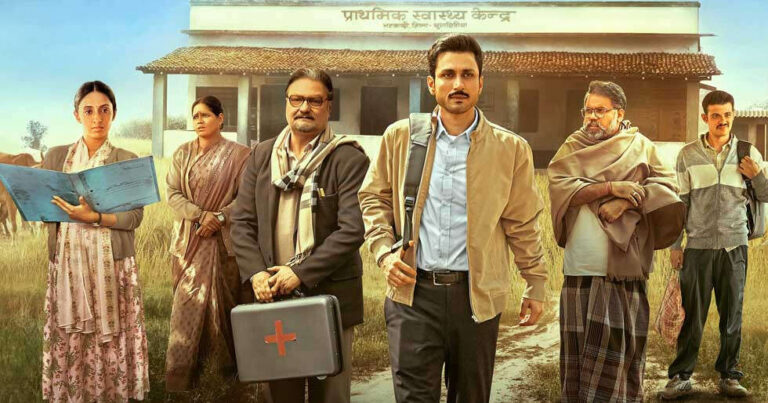Dr. Prabhat Sinha (Amol Parashar) arrives in a distant village of Bhatkandi, Jharkhand completely unprepared for the chaos that’s rural India. He ought to have no less than watched Panchayat, the place Jeetendra Kumar was proven going through comparable points. Dr. Prabhat barely has time to unpack earlier than he’s handed his to-do listing. Approve vaccines for the upcoming camp and not using a receipt? Clearly—as a result of who wants correct protocols? Falsify medical certificates to assist a shady bureaucrat milk his paid go away, studying the nice artwork of getting caught within the feud between two native politicians. As well as, he has to deal with psychological well being in a area the place it is nonetheless thought-about a delusion. This present isn’t aiming for the breezy attraction of Panchayat. That is extra gritty and because the collection progresses, extra melodramatic.
Amol Parashar delivers a dedicated and nuanced flip as Dr. Prabhat Sinha, an idealistic younger medical officer posted to a dilapidated public well being centre. His preliminary enthusiasm is rapidly confronted by the chaotic actuality of rural healthcare: damaged tools, lacking medicines, and a deep public distrust of presidency companies. His interactions with the native quack, the hilariously misinformed Chetak Kumar (performed with nice comedian timing by Vinay Pathak), and the disillusioned employees members type the emotional and comedic core of the present. Mockingly, it’s the quack who teaches the beginner physician the significance of forming good relations with the affected person – ‘Affected person kamaana padta hai, bharosa jeetna padta hai’ (it’s a must to earn the belief of sufferers if you wish to win them over). One other humbling encounter is with the Chief Medical Officer, who says coming right here both as a punishment posting or to fulfill his idealism doesn’t imply Prabhat is doing the village a favour.
The ensemble solid is uniformly sturdy. Anandeshwar Dwivedi and Akash Makhija carry an earthy attraction to their roles because the skeptical but oddly supportive compounder and ward boy respectively, whereas Garima Vikrant Singh stands out because the stoic and grounded nurse Indu. Santoo Kumar, as her troubled son Sudhir, delivers one of many present’s most affecting performances, including a welcome layer of emotional complexity. Akansha Ranjan Kapoor is hardly recognizable as Alia Kapoor’s bestie, taking part in a physician named Gargi who has extra road smarts than Dr. Prabhat. There’s only a trace of romantic curiosity between them and maybe will probably be explored later within the subsequent season.
The music by Nilotpal Bora and songs like Kanchi tori kaya and Kanhaiya add cultural texture and a way of place, superbly underscoring moments of neighborhood and catharsis.
But for all its sincerity and ability, Gram Chikitsalay feels considerably formulaic. The narrative beats unfold predictably, echoing Panchayat so intently that at occasions it looks like a remix reasonably than a contemporary take. The five-episode arc lacks narrative urgency, and whereas the rural-vs-urban theme stays related, the collection doesn’t provide new insights into it. The inclusion of melodramatic subplots, notably round political interference and household trauma, often bogs down the storytelling.
Finally, Gram Chikitsalay is elevated by its earnest performances and genuine setting, however would have benefitted from tighter writing and a extra authentic structural method. It’s a worthy look ahead to followers of rural dramas, however one which leaves you wishing it had taken just a few extra dangers. The collection is at the moment streaming on Amazon Prime Video.

